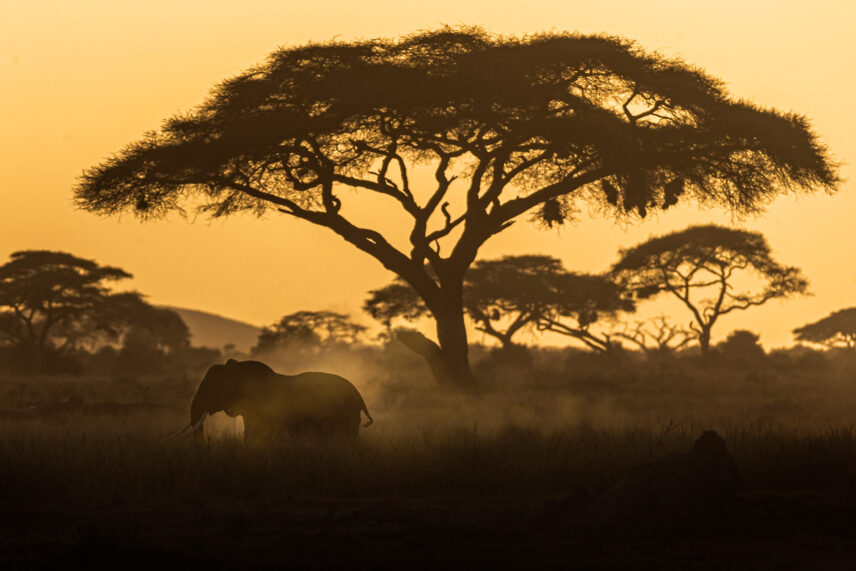
Ask Angela is Thomson’s monthly advice column, where Angela Woods, Manager of Guest Services, answers your questions about safari and Kilimanjaro trekking. Subscribe to our newsletter to get her tips straight to your inbox!
-
We saw that Thomson offers a hot-air balloon ride as an extra. We’d like to know a little more – what’s that experience like?
– BillHi Bill,
A hot-air balloon ride is a fantastic addition to any safari that will take your experience to new heights (literally).
A hot-air balloon outing goes like this: early in the morning, before dawn, you’ll head out to the launch site. As the balloon fills with air, you’ll get in the basket from the side by scooting into your seat while it’s still on the ground. Once the balloon is fully inflated, it’s time for take-off! Depending on the weather, you’ll float over the plains for 30 minutes to an hour, taking in an incredible view at sunrise. How high your balloon will go depends on the weather as well, but either way, you’ll see some incredible sights. You might see some wildlife, too!
Once you touch down, you’ll be escorted to fully set-up dining tables in the middle of the savanna. After everyone’s settled in, you’ll celebrate with a champagne toast, a hot-air ballooning tradition, before diving into a full English breakfast. It’s a delicious way to end a truly unforgettable day in the wild. If this sounds like something you’d be interested in, call us when you’re ready to book your safari and mention that you want to go on the hot-air balloon.
-
I’m little taller than most folks, will I be comfortable in the vehicle that we’ll be in every day?
– JennyHi Jenny,
Thanks for reaching out, Jenny! It’s incredibly important to us that you have a comfortable experience while journeying around Tanzania, regardless of what the roads or conditions might be like. This is why we use customized safari vehicles, which include thoughtful quality-of life features for all of our guests, no matter how big or small they may be.
Each vehicle has space for eight, but we only seat six people in each one. That way, you won’t have to worry about your particular car being too crowded or about fighting for a window seat, as everyone has one! The pop-up roof is another fantastic feature, which enables you to get the best views for wildlife photography and also means your husband will get ample opportunities to stretch his legs throughout the day.
They are close-sided, as well, so you won’t have to worry about the sun or weather marring the experience. And, best of all, they can take on the toughest terrain, so you’ll have a smooth ride. So yes, I think you’ll be perfectly comfortable each day. I can’t wait to hear how your trip went when you get back!
-
Will I need to pack extra clothes for Gibb’s Farm? Should I bring something dressy for dinner?
– Marie C.Hi Marie,
When you’re packing for safari, function is more important than fashion. You’ll see plenty of guests wearing their safari gear while at Gibb’s Farm. It’s pretty casual! However, many guests like to take a break from their safari gear and bring a few nicer outfits – sundresses, blouses, nice slacks, for example, to wear during meals or while lounging at the lodge, but it’s not required.
Since Gibb’s Farm is at elevation in the Ngorongoro Highlands, temperatures can take a dip in the evenings and stay chilly through the morning hours, especially in June. Bring warmer layers to stay comfortable.
Daytime at Gibb’s can be warm enough to enjoy the gorgeous infinity pool on the property, remember to pack your bathing suit!
-
Help! I’m going on safari, and I don’t have a camera. Where do I start in my research?
– Savanna L.Hi Savanna,
It depends on you! There are so many camera options out there–including not taking a camera at all! Smartphone photography has improved so much over the years, and it’s perfectly suitable for capturing memories on safari.
Options for digital equipment range from high resolution point-and-shoots to SLR cameras with detachable lenses (such as my Canon EOS Rebel T6, which I’ve used on my safaris). Most amateurs find compact point-and-shoots perfect for safari–cameras like the Nikon COOLPIX A900 or Canon Powershot SX410 IS. There are lower-priced options available that will still provide wonderful quality photos to share with family and friends!
When you have time, I recommend visiting your local camera shop and speaking with a professional about what kind of camera equipment best suits you.
For zoom/focus length, 18 to 300mm is an excellent choice. You’ll have the range to take photos of animals a few feet or a hundred yards away! Also bear in mind that you’ll want to take photos of people and landscapes (the view from the Ngorongoro Crater rim), so flexibility is key.
Just remember, the best shots will come from a camera you are familiar and comfortable with. Set aside some time to take photos of the squirrels and birds in your backyard before heading out on safari with your new equipment!
-
Is birding in Tanzania any good? How many birds are there?
– Benedict P.Hi Benedict,
YES! Birding in Tanzania is an absolute dream–with 500+ species fluttering across the Serengeti alone, it’s no wonder the country is considered a birder’s paradise!
The Serengeti is home to a diverse avian community, featuring ostriches, secretary birds, African fish eagles, Fischer’s lovebirds, lilac-breasted rollers, starlings and vultures aplenty. Most of these feathered friends are permanent residents, meaning that birding in the Serengeti is excellent year-round.
Soaring through the skies of Ngorongoro Crater are specialized grassland birds, like flamingoes, kori bustards and crowned cranes. Migratory birds, such as kaleidoscopic European bee-eaters, can be found here from September to April.
Tarangire National Park boasts about one-third of Tanzania’s avian population, turning the eyes upward of even the most focused mammal watchers. You could spot hornbills, ashy starlings, cinnamon-chested bee-eaters, hammerkops and, if your safari takes you to Silale Swamp, thousands upon thousands of pelicans and Marabou storks.
You don’t even have to leave your tent to revel in their beauty! Thomson’s Nyumba camps are nestled deep in the wilderness, ensuring you’ll wake up every morning to beautiful birdsong.
-
Are there a lot of bugs on safari? Mosquitos? Am I going to find creepy, crawly bugs in my tent late at night?
– Jill H.Hi Jill,
I’ve been on multiple safaris, and I’ve read every piece of feedback that guests submit about theirs. These sources make one thing clear: bugs are very rarely a problem on safari. This is partially because northern Tanzania’s climate is temperate, which means it isn’t very “buggy.”
The scarce bugs that are around seldom get past the zippers and flaps of a Thomson tent. But as a precaution, guests are advised to keep their tents closed at all times, and to always turn off the lights when they’re not inside.
If you’re an early riser or night owl, you’ll want to prepare for mosquitos, which are most active before dawn, after dusk and at night. I recommend dressing in long sleeves, pants and longer socks at these times so the pests don’t pester you.
Additionally, a bug repellent with 30-50% DEET is a powerful way to get them to buzz off. You’ll want to consult a doctor about alternatives if you have sensitive skin or if you’re traveling with young children.
One bug you may find a little more often on safari is the tsetse fly. Tsetses are a bit more prevalent during the green season and in national parks at lower elevations. Surprisingly, tsetses don’t mind DEET. Citronella-based repellents seem to be more effective with them.
In short, bugs are not very present on safari, and a strong set of repellents will help keep away those that are. The rest is up to wearing the right clothes and keeping your tent secure!
-
Is it true that I need to avoid wearing blue and black clothing on safari? Why are there so many clothing recommendations?
– Erin P.Hi Erin,
I hear you–our packing list has a lot of specific item recommendations! First, we recommend avoiding blue and black simply because those colors are known to attract tsetse flies. Muted colors, like beige, khaki and green are going to be less attractive to the tsetses!
Other than that, there is no dress code anywhere on a Thomson safari. Some guests like to bring a “nicer” shirt or skirt for dinners at Gibb’s Farm, but it’s certainly not required!
It’s also good to know that laundry services are available at all Thomson camps for $1-3 a garment. This means you don’t need to stuff your duffel to capacity; you can do laundry at any camp, so long as weather permits (garments are line-dried) and you’re spending at least 24 hours there.
Overall, plain-colored, lightweight fabrics are the smartest choice when you’re packing. The online safari store, includes the classic khaki, beige and muted greens, which work best to manage temperatures, and keep you looking clean and remain unobtrusive as you observe Tanzania’s remarkable wildlife.
-
I can walk a short distance and climb into vehicles. Otherwise, I use a manual wheelchair (pushed by my son). Would your safaris work for me?
– Kathy H.Hi Kathy,
Yes, a Thomson safari would work wonders! Over the decades, we’ve taken so many guests who used travel wheelchairs and other mobility devices on safari, and they’ve consistently come home with glowing reviews. Just let us know about your mobility requirements in advance, and we’ll handle the rest.
It’s in your favor that safari can be as sedentary as you like–you and your fellow travelers will spend a lot of your time spotting wildlife from a Thomson Land Rover. If you’re able to stand with support, the vehicle’s pop-top roof lets you lean against its strong, tall sides for unobstructed wildlife viewing.
Here are some other ways Thomson makes mobility easier:
- Thomson can reserve the tents/rooms closest to the camp’s common area to minimize the distance to your bed.
- Thomson can provide a small step to help you in and out of the Land Rover.
- For some activities, like the Eastern Serengeti walking safari, Thomson can provide a vehicle that follows your group–you can explore with your fellow travelers, then ride in the vehicle at your convenience.
And if scheduled safaris or Thomson’s Nyumba camps aren’t a good fit, we can always consider private and custom safaris. We’re also happy to connect you with past Thomson travelers who can share their experience with mobility on safari–just reach out and we’ll put you in touch!
-
Thomson store my wife’s insulin?
– Dominic M.Hi Dominic,
Yes, yes, and yes! After 40+ years leading safaris, we’ve learned to accommodate just about anything Thomson guests need. Just be sure to let your safari consultant know your requirements as you plan your trip.
For CPAP users on safari—breathe easy! During your time in Thomson’s Nyumba camps, guides can provide 12-volt car batteries to power your CPAP machine at night, which staff will re-charge during the day. At the lodges, you can plug your CPAP machine directly into the wall outlets using the appropriate adapters (generally the outlets are U.K. style). You may need to bring some additional components depending on the model of your machine—something we’ll go over in detail once we schedule your safari!
There’s a sound solution for hearing aids too! Simply charge them using the outlets available in the vehicles or in the lounge tents. On the insulin front, Thomson Safaris has had a number of guests who take medication that needs to be refrigerated, and we’re happy to assist with any special requirements.
This is your adventure, so share your needs or concerns early on and let us worry about the details, so you can focus on the wildlife!
-
I’m concerned about bathroom access on safari. When we’re on a wildlife drive, where do we “go”?
– Celia B., Scottsdale, AZHi Celia,
You’re not alone in wondering–this is probably the #1 most common question guests ask!
I’ll start by saying, Thomson guides are completely understanding about the need to “go” on the road. They’ll let you take breaks at park entrances, rest stops and picnic areas, where restrooms are usually available. But what should you do if you’re in between bathroom stops when nature calls?
First, don’t hesitate to let your guide know. It’s normal and expected to make pit stops in the savanna. Your guide may even make a few himself on a wildlife drive–it just goes to show, it’s all part of the routine!
Simply ask your guide if you can “check the tires,” and he’ll know what you mean. He’ll start scouting for a safe, private spot where you can attend to your needs behind the back bumper.
If you can make it back to camp, you’re welcome to beeline for your tent’s private bathroom or opt for the toilet tent near the lounge. But there’s no need to stress your body out if you can help it; the roadside has been a tried-and-trusted restroom for every living thing, everywhere, since forever!
And honestly? It’s a surprisingly memorable experience!
-
I’m planning a safari for November, but I have a food conundrum. My daughter is vegetarian. My husband is gluten-free. My son is a picky eater. I’m wondering, what kind of food is served on safari?
– Norma G., Milwaukee, WIHi Norma,
Let me put you at ease: Everyone is going to eat so well! Thomson camp chefs can accommodate any dietary preference–they just need to know the details ahead of time.
For your vegetarian daughter, they’ll pull out all the stops. Expect flavorful plates of sauce-smothered veggies on rice, handmade pastas, quiches and more. All in generous proportions. Plus, fresh fruits like mango, papaya and pineapple are available at every meal.
Your gluten-free husband can look forward to firsts (and seconds, and thirds) of tender meats, Celiac-friendly desserts and specially made breads to accompany his soups. Everything is prepared in separate, sanitized stations to eliminate the risk of cross contamination.
Your picky eater will have a smorgasbord of comfort food: breaded chicken, eggs and cheese, burgers and so on. Thomson chefs craft their menus for the western palate, but you’ll have plenty of opportunities to try East African flavors, too.
In short, no matter what your dietary preference is, the Thomson chefs know how to zest to impress!
-
I’m interested in the Great Migration in Tanzania and Kenya and planning to travel in January. It seems there aren’t many safaris at that time. Is it not a good time to see the most animals? When is the best time?
– Susan S.Hi Susan,
January is actually one of my favorite times to go on safari! My first trip to Tanzania was during this season, and it was magical.
The green season begins in January, and the plains are lush, the weather is gorgeous and the wildlife is happy. It’s also when the calving season begins: just imagine, hundreds of thousands of wildebeest calves and zebra foals (and lion cubs, and piglets and so on!) being born across the Serengeti.
While calving only happens early in the green season, the Great Migration is visible year-round in Tanzania; there’s no “best” time to go on safari. So long as you avoid the heavy rains of April and early May, you’re going to see tons of wildlife!
In Kenya, you can only see the Great Migration during the summer months, which may explain why you didn’t see many safaris in January.
January tends to be quieter, since many travelers have more time to travel during the summer and winter holidays. But if you have the flexibility to safari in January, go for it! The wildlife is stunning any time of year. And because there are fewer people out there, you’ll have a lion’s share of sightings to yourself.
-
How do you keep wildlife from coming too close to us? To the tents at night?
– Tom Tobino, Bend, OregonHi Tom,
One of the best parts about safari is that the animals are accustomed to safari vehicles–they’ll sometimes wander right up next to yours! It’s exciting, and it’s all the more reason for safety to be Thomson’s #1 priority.
When you’re on wildlife drives, you’re led by guides who have decades of experience understanding animal behavior. They’re always looking and listening, making sure the wildlife isn’t behaving in a way that suggests the vehicle is too close. Plus, your vehicle is designed with safety in mind: it has a tall frame and pop-top roof that can be closed at any time.
Same goes for camping! Thomson’s Nyumbas put you in the thick of the wilderness, where you’ll often fall asleep and wake up to the sounds of wildlife. These camps work so well because there are strict safety protocols in place. Guards patrol day and night. There’s no reason you’ll need to leave your tent at night, but if you do, you have a bell you can ring for assistance.
Long story short, in Thomson’s 40-plus years on safari, there have never been any notable interactions between animals and guests. That alone is a testament to the strength of the precautions taken by Thomson guides, staff and guests.


